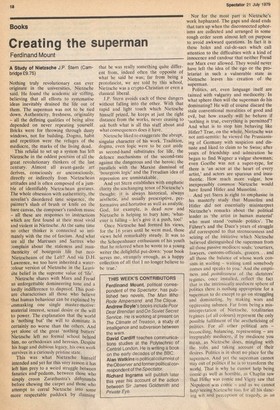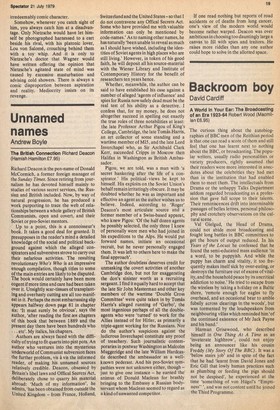Creating the superman
Ferdinand Mount
A Study of Nietzsche J.P. Stern (Cambridge £9.75) Nothing truly revolutionary can ever originate in the universities, Nietzsche said. He found the academic air stifling, believing that all efforts to systematise ideas inevitably drained the life out of them. The superman was not to be tied down. Authenticity, freshness, originality — all the defining qualities of being alive depended on never repeating yourself. Bricks were for throwing through dusty windows, not for building. Dogma, habit and repetition were the refuges of the mediocre, the marks of the living dead.
This reftal to set up a system has left Nietzsche in the oddest position of all the great revolutionary thinkers of the last century. Almost all avant-garde art derives, consciously or unconsciously, directly or indirectly from Nietzschean attitudes and is often composed of a jumble of identifiably Nietzschean gestures. The whole obsession with authenticity, the novelist's disordered time sequence, the painter's slash of brush or knife on the bare canvas, the composer's random music — all these are responses to instructions which are first found at their most vivid and violent in Nietzsche. At the same time no other thinker is connected so intimately with the rise of fascism. And what are all the Marcuses and Sartres who complain about the staleness and inauthenticity of bourgeois life but neoNietzscheans of the Left? And via D.H. Lawrence, we too have inherited a watercolour version of Nietzsche in the Leavi;ite belief in the supreme value of 'life' Nietzsche shares with Marx and Freud an unforgettable domineering tone and a lordly indifference to disproof. This posture characterises all those who believe that human behaviour can be explained by unmasking one single master-motive: material interest, sexual desire or the will to power. The explanation that the world is 'nothing but' the will to dominate is certainly no worse than the others. And yet alone of the great 'nothing butters' Nietzsche left no formal school behind him, no orthodoxies and heresies. Despite his huge and dubious legacy, his OWill work survives in a curiously pristine state.
This was what Nietzsche himself intended and yet for this very reason it has left him prey to a weird struggle between fanatics and-pedants, between those who simply croon Zarathustra's dithyrambs before chewing the carpet and those who attempt to corral Nietzsche into some more respectable paddock by claiming that he was really something quite different from, indeed often the opposite of what he said he was; far from being a protofascist, we are told by this school, Nietzsche was a crypto-Christian or even a classical liberal.
J.P. Stern avoids each of these dangers without falling into the other. With that rapid and light touch which Nietzsche himself prized, he keeps at just the right distance from the works, never ceasing to ask both what is all this stuff about and what consequences does it have.
Nietzsche liked to exaggerate the abrupt, singular character of his work. Tradition, dogma, even logic were to be cast aside as second-hand substitutes for life, the defence mechanisms of the second-rate against the dangerous and the heroic; the parallels with the Marxist dismissal of 'bourgeois logic' and the Freudian idea of repression are unmistakable. And yet Stern establishes with emphatic clarity the unchanging tenor of Nietzsche's thought: it is always historical, always asthetic, and usually prescriptive, performative and hortative as well as analytic. God, for example, is dead /tow and Nietzsche is helping to bury him; 'whatever is falling — let's give it a push, tool' Once Nietzsche had formed his views, for the 16 years until he went mad, those views held remarkably steady. It was to the Schopenhauer enthusiasm of his youth that he referred when he wrote to a young writer the delightful put-down: 'your book serves me, strangely enough, as a happy collection of all that I no longer believe to be true.' Nor for the most part is Nietzsche's work haphazard. The gaps and dead ends that turn up when the disconnected aphor isms are collected and arranged in some rough order seem almost left on purpose to avoid awkward questions. In fact it is these holes and cul-de-sacs which call attention to the difficulties with a kind of innocence and candour that neither Freud nor Marx ever allowed. They would never have left the idea of the ego or the proletariat in such a vulnerable state as Nietzsche leaves his creation of the superman.
Politics, art, even language itself are tainted with vulgarity and mediocrity. In what sphere then will the superman do his dominating? He will of course discard the stale conventional moralities of good and evil, but how exactly will he behave if 'nothing is true, everything is permitted'? And what is to stop him behaving like Hitler? True, on the whole, Nietzsche was not anti-semitic: he viewed the Prussianising of Germany with suspicion and distaste and liked to claim to be Swiss; after years of friendship and admiration he began to find Wagner a vulgar showman; even Goethe was not a super-type, for there is 'an actor at the heart of every artist,' and actors are spurious and inauthentic. How much more vulgar, how inexpressibly common Nietzsche would have found Hitler and Mussolini.
And yet Stern is right to emphasise in his masterly study that Mussolini and Hitler did not essentially misinterpret Nietzsche's remarks about the political leader as 'the artist in human material' who must stand 'outside politics'. The Fiihrer's and the Duce's years of struggle did correspond to that strenuousness and seizing of the initiative which Nietzsche believed distinguished the superman from all those passive mediocre souls: 'courtiers, lawyers, customs-officials, grocers.. . and all those the balance of whose work consists in waiting — waiting until somebody comes and speaks to you.' And the emptiness and pointlessness of the dictators' regimes, once installed, reflect the fact that in the intrinsically mediocre sphere of politics there is nothing appropriate for a superman to do except to go on struggling and dominating, by making wars and oppressing submen. Far from being a misinterpretation of Nietzsche, totalitarian regimes (of all colours) represent the only possible fulfilment of the aestheticising of politics. For all other political arts — reconciling, balancing, representing — are irreparably mediocre, if by mediocre you mean, us Nietzsche does, mingling with the yobs and taking account of their desires. Politics is in short no place for the superimin. And yet the superman cannot stay out of politics if lie is to transform the world. That is why he cannot help being comic as well as horrible, as Chaplin saw that Hitler was comic and Vigny saw that Napoleon was comic — and as we cannot help seeing Nietzsche too, for all his dancing wit and Perception of tragedy, as an irredeemably comic character.
Somehow, whenever you catch sight of him, you always catch him at a disadvantage. Only Nietzsche would have let himself be photographed harnessed to a cart beside his rival, with his platonic lover, Lou von Salom6, crouching behind them with a toy whip. And it is only to Nietzsche's doctor that Wagner would have written offering the opinion that Nietzsche's agitated state of mind was caused by excessive masturbation and advising cold showers. There is always a comic disproportion between aspiration and reality. Mediocrity insists on its revenge. THIS WEEK'S CONTRIBUTORS Ferdinand Mount, political correspondent of the Spectator, has published two novels, The Man Who Rode Ampersand and The Clique. Andrew Boyle's books include Poor Dear Brendan arid On Soviet Secret Service. He is working at present on The Climate of Treason, a study of intelligence and subversion between the wars.
David Cardiff teaches communications studies at the Polytechnic of Central London. He is writing a book on the early decades of the BBC. Alan Watkins is political columnist of the Observer and former political correspondent of the Spectator.
Richard Ingrams will publish later this year his account of the action between Sir James Goldsmith and Private Eye.



































 Previous page
Previous page